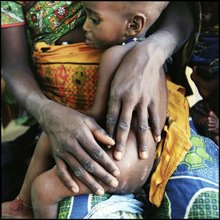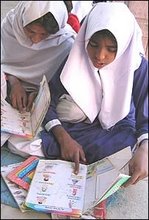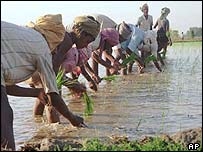PREAMBLE: For this issue we present verbatim, a recent report by Amnesty International which outlines the desperate situation of the people of Gaza due to the Israeli blockade. While this seemingly archaic military tactic continues to be excused by Israel as an act of self-defence, independent analyses have revealed this to be capricious in terms of the range of prohibited items, and it is obviously counter-productive to the peace effort although apparently good politics in Israel itself. On the ground however, the situation is nothing less than a humanitarian disaster, especially as over half the Gaza population are children.
Regarding the boarding of a relief ship on which 9 relief workers were killed by Israeli military, while it is obvious that this must be subjected to an internal inquiry, it is doubtful that this will prove satisfactory in the eyes of world opinion. An international inquiry appears to be in order, as proposed by the United Nations and many countries which have voiced criticisms of Israel's blockade.
We also note that the Harper government of Canada has aligned itself so completely with the Israeli position that it appears to have lost the capacity for impartial analysis. The presence on the Israeli tribunal of a former Canadian military judge advocate (one of only two international observors) will surely be tainted by this, at least as a matter of perception. For a June 14 BBC article on the tribunal membership, see: http://news.bbc.co.uk/2/hi/world/middle_east/10309872.stm
In the present politically disingenuous fog of asymmetrical violence, organizations such as Amnesty Internatinal play an indispensable role in bringing an independent view to bear on this example of massive unresolved human rights abuse.
AMNESTY INTERNATIONAL REPORT:
Suffocating Gaza - the Israeli blockade's effects on Palestinians
Israel's military blockade of Gaza has left more than 1.4 million Palestinian men, women and children trapped in the Gaza Strip, an area of land just 40 kilometres long and 9.5 kilometres wide.
Mass unemployment, extreme poverty and food price rises caused by shortages have left four in five Gazans dependent on humanitarian aid. As a form of collective punishment, Israel’s continuing blockade of Gaza is a flagrant violation of international law.
The situation in Gaza has been made worse by the Egyptian government’s general closure of the Rafah crossing, although this was opened following the deaths of activists on the Gaza flotilla.
However, it is Israel, as the occupying power, that bears the foremost responsibility for ensuring the welfare of the inhabitants of Gaza.
Closed crossings
Since the blockade of Gaza was imposed in June 2007, none of the Israeli-controlled crossings between Gaza and Israel has been open in a regular or consistent way, and relatively little aid is getting through.
The one other land crossing at Rafah, on the border between Gaza and Egypt, is kept shut most of the time. The closures prevent the movement of Palestinians into and out of Gaza in all but a handful of cases, generally in exceptional humanitarian cases.
Basic goods
The blockade prohibits most exports and restricts the entry of basic goods, including food and fuel. Much of the available food is provided by the UN and other aid agencies, or smuggled in through tunnels running under the Egypt-Gaza border and then sold on at exorbitantly high prices to Gaza’s beleaguered residents.
The situation has been made worse by the Egyptian government’s construction of a steel wall along the border at Rafah to disrupt the cross-border smuggling that has become Gaza’s lifeline, as well as the bombing of tunnels by the Israeli airforce.
Economic collapse
Rather than targeting armed groups, the blockade mainly hits the most vulnerable, such as children (who make up more than half of the population in Gaza), the elderly, the sick and the Gaza Strip's large refugee population.
According to the United Nations Relief and Works Agency, the number of refugees living in abject poverty in the Gaza Strip has tripled since the blockade began. These families lack the means to purchase even the most basic items, including soap, school materials and clean drinking water. According to the UN, more than 60 per cent of households are currently "food insecure".
Lack of facilities
There are worsening problems with the supply of electricity in the Gaza Strip, with many residents enduring 8-12 hours of power cuts each day. There are also recurrent shortages of cooking gas, requiring the implementation of a rationing scheme in which hospitals and bakeries are prioritized.
Aid blocked
While Israel allows some humanitarian supplies from international aid agencies into Gaza, these are strictly limited and frequently delayed. UN agencies have said that additional storage and transportation costs incurred from delays due to the blockade totalled around $5 million in 2009.
Health
Gaza's health sector has been plagued by shortages in equipment and medical supplies during the blockade.
Following the Israeli closure of crossings, people with medical conditions that cannot be treated in Gaza have been required to apply for permits to leave the territory to receive treatment in either foreign hospitals or Palestinian hospitals in the West Bank.
The Israeli authorities frequently delay or refuse these permits; some Gazans have died while waiting to obtain permits to leave the territory for medical treatment elsewhere.
World Health Organization (WHO) trucks of medical equipment bound for Gazan hospitals have repeatedly been turned away, without explanation, by Israeli border officials.
The Gaza conflict
From 27 December 2008 to 18 January 2009, Gaza was subjected to a devastating Israeli military offensive – Operation “Cast Lead” – which Israel said it carried out to stop Hamas and other Palestinian armed groups firing indiscriminate rockets into Israel.
More then 1,380 Palestinians were killed, including more than 300 children and other civilians, and thousands were injured. Many thousands of homes were destroyed or severely damaged, as were the electricity and water systems. Civilian buildings, including hospitals and schools, were also damaged or destroyed by Israeli attacks.
Operation “Cast Lead” pushed the humanitarian crisis in Gaza to catastrophic levels. Since it concluded, the blockade has severely hampered or prevented reconstruction efforts. With many construction materials barred or limited by Israel, Gaza’s inhabitants are unable to rebuild their shattered lives.
Continued violence
In November 2009, Hamas declared a unilateral cessation of rocket fire, although this has since been breached on several occasions by members of Palestinian armed groups.
Since the ceasefire following Operation “Cast Lead” in January 2009, one person in southern Israel has been killed by mortars and rockets fired by Palestinian armed groups.
Israeli military forces, meanwhile, have conducted regular raids into Gaza and have continued to bomb the tunnels under the border at Rafah used for smuggling between Gaza and Egypt. In the year following Operation “Cast Lead”, 71 Palestinians were killed and 130 injured in the Gaza tunnels from tunnel collapse, accidents or airstrikes.
Israeli soldiers also continue to shoot at Palestinian farmers, fishermen and other civilians when they venture near Gaza’s perimeter or approach the three nautical mile limit that Israel imposes on Gaza’s coastline causing deaths and injuries.
Collective punishment
The Israeli authorities have put forward a range of justifications for the blockade - saying variously that it is a response to attacks from Palestinian armed groups, a reaction to the continued holding of the captured Israeli soldier Gilad Shalit, and a means to pressure the Hamas de facto administration.
But whatever its stated justification, the blockade is collectively punishing the entire population of Gaza, the majority of whom are children, rather than targeting the Hamas administration or armed groups.
SOURCE: Amnesty International June 1, 2010. http://www.amnesty.org/en/news-and-updates/suffocating-gaza-israeli-blockades-effects-palestinians-2010-06-01
FROM a Great Canadian and World Statesman
"A great gulf... has... opened between man's material advance and his social and moral progress, a gulf in which he may one day be lost if it is not closed or narrowed..."
Lester B Pearson
http://nobelprize.org/nobel_prizes/peace/laureates/1957/pearson-lecture.html
Tuesday, 15 June 2010
Subscribe to:
Comments (Atom)
INSPIRATIONAL WELCOME ............................... from T.S.Eliot's "Little Gidding"
If you came this way From the place you would come from... It would be the same at the end of the journey...
If you came, not knowing what you came for, It would be the same... And what you thought you came for Is only a shell, a husk of meaning... From which the purpose breaks only when it is fulfilled If at all.


























